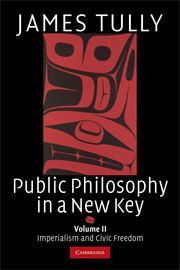Book contents
- Frontmatter
- Contents
- Acknowledgments
- Credits
- INTRODUCTION
- PART 1 GLOBAL GOVERNANCE AND PRACTICES OF FREEDOM
- PART 2 ON IMPERIALISM
- CONCLUSION: CIVIC FREEDOM CONTRA IMPERIALISM
- 8 A new kind of Europe? Democratic integration in the European Union
- 9 On local and global citizenship: an apprenticeship manual
- Bibliography
- Index to Volume II
9 - On local and global citizenship: an apprenticeship manual
Published online by Cambridge University Press: 05 September 2012
- Frontmatter
- Contents
- Acknowledgments
- Credits
- INTRODUCTION
- PART 1 GLOBAL GOVERNANCE AND PRACTICES OF FREEDOM
- PART 2 ON IMPERIALISM
- CONCLUSION: CIVIC FREEDOM CONTRA IMPERIALISM
- 8 A new kind of Europe? Democratic integration in the European Union
- 9 On local and global citizenship: an apprenticeship manual
- Bibliography
- Index to Volume II
Summary
INTRODUCTION: GLOBAL CITIZENSHIP AS NEGOTIATED PRACTICES
This concluding chapter draws together the strands of argument throughout the two volumes of Public Philosophy in a New Key. It weaves these diverse strands into a sketch of a new kind of local and global citizenship I call ‘glocal’ citizenship. This mode of citizenship has the capacity to overcome the imperialism of the present age and bring a democratic world into being.
‘Global citizenship’ has emerged as the locus of struggles on the ground and of reflection and contestation in theory. This is scarcely surprising. Many of the central and most enduring struggles in the history of politics have taken place in and over the language of citizenship and the activities and institutions into which it is woven. One could say that the hopes and dreams and fears and xenophobia of centuries of individual and collective political actors are expressed in the overlapping and conflicting histories of the uses of the language of citizenship, the forms of life in which they have been employed and the locales in which they take place. This motley ensemble of contested languages, activities and institutions constitutes the inherited field of citizenship today.
The language of ‘global’ and ‘globalisation’ and the activities, institutions and processes to which it refers and in which it is increasingly used, while more recent than citizenship, comprise a similarly central and contested domain.
- Type
- Chapter
- Information
- Public Philosophy in a New Key , pp. 243 - 310Publisher: Cambridge University PressPrint publication year: 2008
- 2
- Cited by



